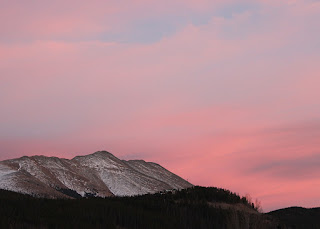 |
| October 2012 weather over Breckenridge, Colorado. Copyright 2012 Ancestral Journeys. |
Forest fires? Tornadoes and hurricanes? Avalanche?
Winter storm? Summer drought?
Mother Nature can be nasty, and the people in our past certainly suffered at her hands. How can you use meteorological information to connect to your familial past?
Developing the story of their daily lives can take many angles, and weather is one that should not be missed. How did they deal with extreme low temperatures in the winter? We have insulation, heat supplies in various forms, electric blankets, plastic sheeting to cover windows. They had wood or coal fires, straw and other natural materials, wool blankets.
Finding this data is fairly easy, however, most of the sites I have come across give you one of two things: monthly averages for current history (1990 – forward) or daily measurements for a specific date, which can vary based on what you are looking for. Here are a few options to consider.
- Weather.org “Weather History”… Local weather archives for a day in history (1945 forward). More detailed information than the Farmers’ Almanac.
- National Weather Serivce… Current and historical information on U.S. weather.
- National Weather Service Forecast Office Weather History… Allows you to pick a day and see the significant weather through the years (example link is to the Denver/Boulder office).
- Farmers’ Almanac… Enter a zip code and date (1945 forward) for high/low temperatures, wind readings, etc. Simple and easy to navigate from day to day if you are reasearching a specific time period.
- Chronology of Extreme Weather… Lists world wide historic weather events. Great site if you know of a specific event or time in history that you are looking for.
- GenDisasters… A searchable site with numerous types of disasters from history. Includes weather events and much more (a great site no matter what area you are researching).
I used the Farmers’ Almanac to compile some data from January 1945. Although I was hoping to examine information from Summit County, Colorado, the closest location available to me was the Denver Stapleton Airport (which operated from 1929 to 1995, and has now been replaced with Denver International Airport, or DIA). Although there is a significant difference in elevation between the two locations, it still gave me a good idea of what the temperatures were like for the time period in question. Living in this climate, I can pretty much tell you what to expect on a daily basis, however, if I were researching a family in Mississippi for example, I would have no idea. This is a good process to go through if you truly want to examine how the weather would have affected their daily lives.
I chose to input the data into an Excel spreadsheet. I was able to determine the average daily temperature, and the monthly average temperature. Here’s a quick look:

I could have probably found this data already displayed for me in a similar format, but I find that I “consume” the information much better when I actually work with the numbers, so for me, this process is a valuable use of my time. I will also add that as the month carried on, the temperatures got much lower, with 1.4 degrees Fahrenheit on the 28th of January, 1945 as the coldest recorded for the month.
What did they endure? How did they manage it? I've heard stories of people sleeping with their livestock to stay warm at night, but have not been able to find this in my own research (yet!). Nearly every state has information available for their area, so its worth the time to put in a little effort on your favorite search engine to pull it out of the crowd.
Keep in mind that the National Weather Service is an evolving entity, so the data you are looking for may simply not be available, it may have not been recorded. You can see the history of the NWS on their website.
